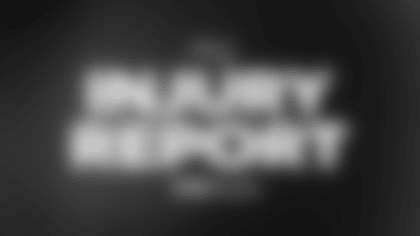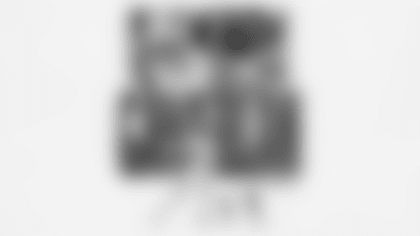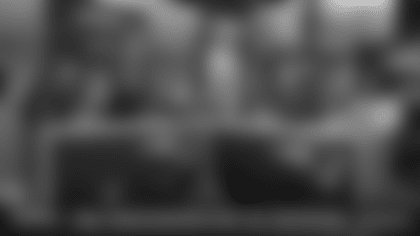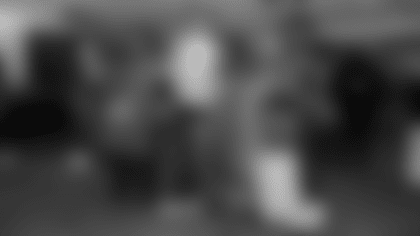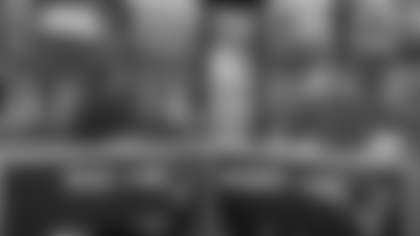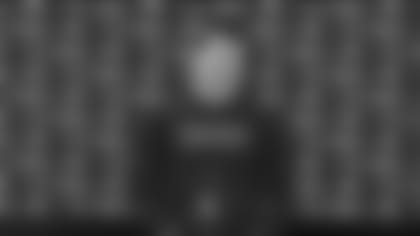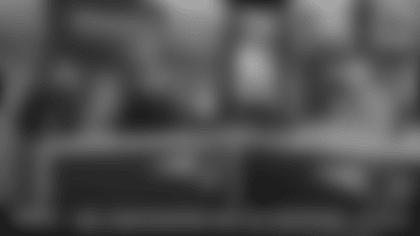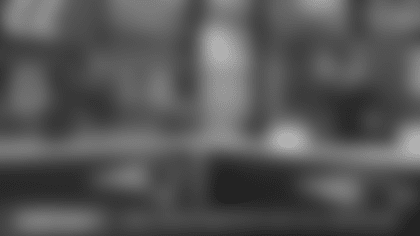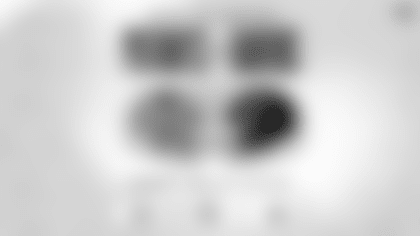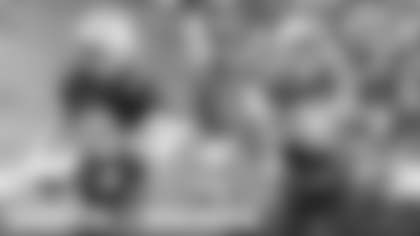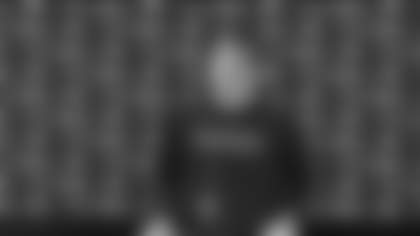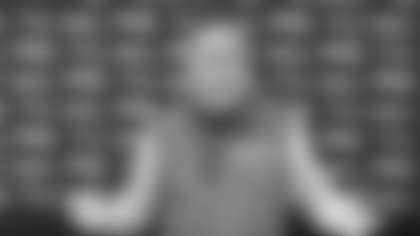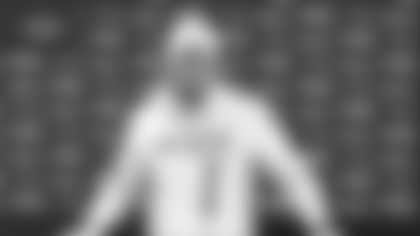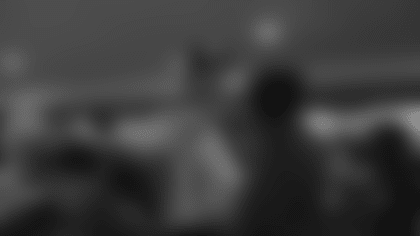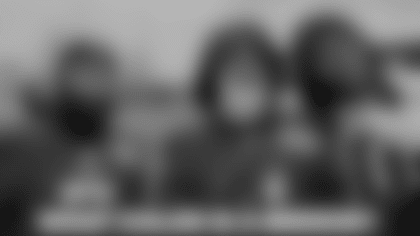New England Patriots defensive coordinator Dean Pees addresses the media during his conference call on Tuesday, December 2, 2008.
Q: The last couple of games you've been up in the coach's box calling the plays. Can you comment on that change? What led to it and how might you be benefiting from that?
DP: What led to it was getting ready for Miami and going into that game. Some of their personnel things dictate what we end up calling. Sometimes it's difficult to get that information from the box down to the sideline in time to make the call and get it in. I've coordinated from up there. In fact, when I coordinated in college most of the time I was upstairs, so we wanted to try it. Bill [Belichick] and I talked about it to see if I could see things a little better and get the calls in quicker. It seemed to work out pretty well in Miami, so we tried it again this last week. It's going to be a week to week thing based on what the other team does. You can actually see the game better and see the problems that develop easier from up there than you can on the sideline. You don't have to have somebody tell you.
Q: While you can see the game better I would image it takes you further away from the playing field. How has it affected your feel for the game in that regard?
DP: The only thing it has really has affected is… because you have Bill [Belichick] down there it's a little different in our situation. He can really speak to the defense. A lot of times he would speak to the front seven while I was speaking to the secondary or the linebackers. The only difference is now he speaks to the whole group. The only downside is that I'm not as close to the secondary and the players. But, the upside is that we can get all the corrections a little quicker and a little cleaner into what actually happens. Sometimes in those first games we were just trying to figure out what actually happened and work that way. Right now, we've got a pretty good grasp on if there is a problem, here's the problem, here's how we can fix it and certainly Bill can relay it to the whole defense down there.
Q: Is there any concern that at this point in the season Jerod Mayo could be wearing down, given all the snaps that he's taken this year?
DP: There's always a concern on all players. They all have to take snaps. It's just that time of the year where everybody is gearing up, everybody's trying to make a run for the playoffs and do as best you can each game. It doesn't' matter what team you're on, everybody has to pull a little extra duty. Everybody has teams that are banged up, guys are out, guys are missing and more guys are taking more snaps. That's just the way it is. There's nothing you can do about it. Really to say it's a concern, it's always a concern on all the players not just Jerod Mayo. But, it is what it is. It's a concern but you go on and say look you have to deal with it and they have to deal with it. They understand it and we understand it.
Q: Do you have to watch a rookie closer because he's never been through the late season grind?
DP: I don't know. You don't know that because he is a rookie and he hasn't been through it, so you really don't know whether that's the case or not. It could go the other way too because he's such a young vibrant guy. It may be easier for him to go through the late season than it might be for an older guy that wears down quicker. There's no real way of telling. Every guy is going to be different. There are some guys that get stronger as the year goes on. You guys have all written about running backs that seem to get stronger as the year goes and the more carries they have the stronger they get. That could be the same thing too on defense. You just don't know. Every guy is an individual case.
Q: Richard Seymour was on the radio yesterday lobbying for a little more playing time on third down. How difficult are those decisions for you as a coach? He's the most talented defensive player you have, but it's not like you can put him out there for every single snap, so how do you determine where and when he plays?
DP: That's a staff decision and Bill really plays an important role on that. Bill really [makes] a lot of the personnel decisions. We sit down and talk about what the scheme is going to be, how we're going to play it, what's the best way that we can do it as a team and what's the best way we can rotate players. How can we do this? How can we do that? It's going to be different every week, game to game, based on what the other team does. We sit down at the beginning of the week and throughout the whole week. We see how the week goes and determine how that's going to go into the game. Really, when it comes to personnel decisions I certainly have input but Bill is the final say on that.
Q: Can you see where Richard is coming from when he says 'I feel like our best players should be on the field on the most important down?'
DP: We always try to put what we think is the best situation and the best players on the field for that situation. Every player, I'm sure, wants to play more and would like to play all the time. All I can tell you is that we make the decision based on what we think the situation is and who should be in there at that time.
Q: You talked about the secondary and third down for much of the season. What are you seeing when teams are converting on third downs, especially third and longs?
DP: Well, generally it's something different every dang time and it's usually dealing with some kind of a technique problem. That's what bothered me about this last game. We've got everybody covered but a guy and generally it was a technique problem more than it was anything else. There's sometimes where I would say we could be in a better defense, we could be in a better call, it might not have been the best situation. Sometimes that happens and you just sit there and say, 'they got me on that one.' We just have to do a better job of doing some of the techniques that we do. We just have to do a better job of it. I don't think it's any one particular thing that I can put my finger on. It seems like every time I write something down, it's something different or it's a different guy. We just have to do better across the board.
Q: Is it more frustrating when it's a technique thing because I assume that's something you guys work on from training camp as a opposed to, if you call a defense and they just beat that defense?
DP: It is. It does become frustrating. It becomes frustrating especially if it's something that you know you've emphasized during the week and maybe you give it up. That's frustrating. Sometimes that's the case, sometimes that's not the case. Sometimes the offensive player makes a better play than the defensive player, the guy makes a great throw, a diving catch or the ball is two inches off the ground and the guy makes a sliding catch. You have to live with some of those. You're not going to get them all. But, certainly we have to do better on third down than what we've been doing. Like I said, that's across the board - all players and me included.
Q: There was one third down play in particular I wanted to ask about. It was third-and-two from the 18 in the third quarter. You guys were trying to get your sub package on to the field and at the snap, three guys rushed from [Ben] Roethlisberger's right and he had an easy dump off to [Heath] Miller. Can I assume that wasn't the way that was designed?
DP: You can assume that's correct. What actually happened is the safety didn't get down. He was supposed to actually be on the tight end, bump and run. He was playing off and he got the call late. Part of the problem was the call getting in late was we had some confusion of what personnel they had in the huddle. They ran the tight end on. He ran all the way to the huddle and then turned around and ran back off. We put in another package and then we made a call late. It should have been an illegal substitution but it wasn't. We got caught on it and the safety came down late, but you're right we should have been up there pointed on the tight end.
Q: Did seeing James Harrison have a big game against you bring back any memories of the history that you had with him?
DP: That's interesting. With James Harrison, the last game of the season in 2001 at Kent State there was one play left in the season, we're 5-5, Kent State hasn't had a winning season in 20 years and we're playing Miami of Ohio and [Ben] Roethlisberger is the quarterback. They have the ball on the 20-yard line going in and we're up 24-20. We know this is going to be the last play, it's a fourth down, unless they convert a first down. I remember calling a pressure where we called time out and I pulled Harrison over to the side and put him on the left side and said, 'look, you've got to get this guy.' They were in the shotgun and by the time the ball got to the quarterback, to Roethlisberger, Harrison had him sacked. So, I've seen that on the good side and I've seen it on the bad. He's was a really excellent player for me.
Q: Didn't he have five sacks in that game?
DP: Yeah in the Miami game and we ended up beating them. It was the first time Kent had beaten Miami in who knows how long. We ended up with a winning season, so it was a big play and obviously he was a very big part of that whole year.
Q: With the lack of turnovers for the team, can you read into that and does it indicate anything?
DP: What you read into it is that we're not creating enough. I don't know. The second and third guys coming in on the pile just have to try and get the ball out a little bit more. We have to do a better job playing the ball in the air. When you don't get turnovers it's generally because you've got one guy tackling the guy maybe not two or three knocking the ball out. Secondly, you're not playing the ball in the air. We've had a few chances where we've dropped the ball, which would have helped us overall. It's always a concern, you want to create turnovers. The turnover the other night to start the game out led to a score which got us off to a good start. Unfortunately, we didn't get any after that. We just have to keep working on trying to get them.
Q: Have you seen a lack of a second and third guy getting in there?
DP: No, not necessarily. I just haven't seen us ripping the ball off the guy. We just have to keep emphasizing that point. We've had plenty of times when we've had two and three guys in on the tackle, but I think we're just making the tackle. We have to do a better job of trying to strip the ball out of there and get the ball off the runner when we get him held up.


